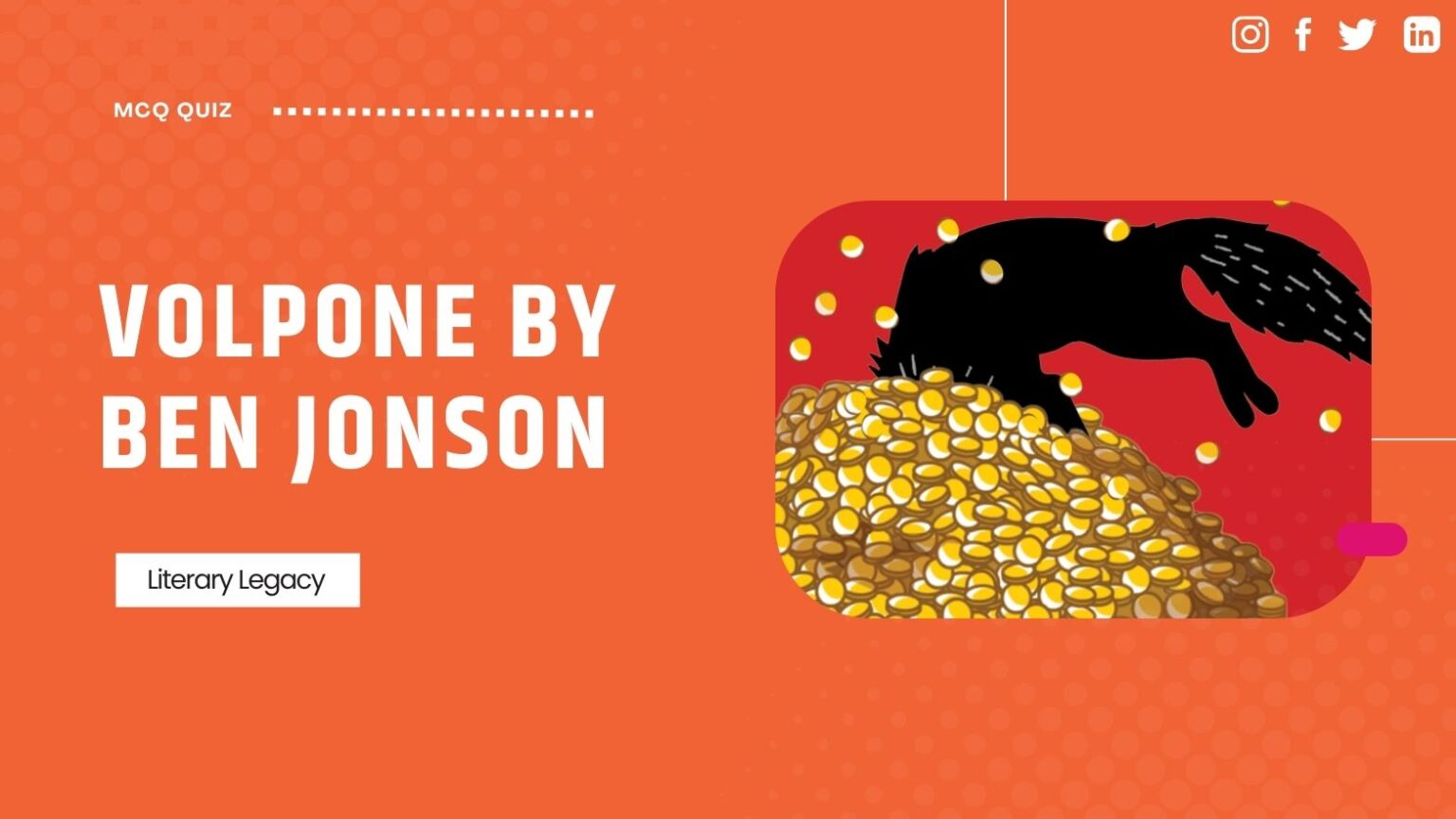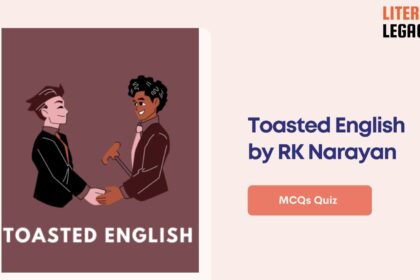1. What does Volpone primarily worship in the play?
Choices
A) His family
B) His friends
C) His wealth
D) His reputation
Answer: (C)
His wealth
Volpone’s character is defined by his greedy obsession with money.
2. How does Mosca initially behave towards Volpone?
Choices
A) With complete independence
B) With open hostility
C) As an equal partner
D) In a servile manner
Answer: (D)
In a servile manner
Mosca acts as a servant to Volpone while concealing his growing independence.
3. What motivates the legacy hunters to present gifts to Volpone?
Choices
A) They are trying to sabotage each other’s chances.
B) They believe Volpone is ill and want to comfort him.
C) They want to assure themselves a share of his wealth.
D) They hope to curry favor to become his friends.
Answer: (B)
They believe Volpone is ill and want to comfort him.
The legacy hunters are motivated by the belief that Volpone is ill and thus wish to comfort him, hoping this generosity will lead to being named his heir.
4. Which character is described as the voice of goodness and religiosity?
Choices
A) Celia
B) Corvino
C) Mosca
D) Voltore
Answer: (A)
Celia
Celia stands in stark contrast to the corrupt nature of the other characters.
5. What is Voltore’s profession?
Choices
A) Banker
B) Merchant
C) Lawyer
D) Politician
Answer: (C)
Lawyer
Voltore’s profession as a lawyer makes him adept in deceit and manipulation.
6. Which character is described as Volpone’s parasite?
Choices
A) Celia
B) Voltore
C) Mosca
D) Corvino
Answer: (C)
Mosca
Mosca serves as Volpone’s parasite, acting in roles of servant, slave, and lackey, contributing to Volpone’s schemes.
7. What is Corvino’s primary concern regarding Celia?
Choices
A) Her property value
B) Her faith
C) Her loyalty
D) Her well-being
Answer: (A)
Her property value
Corvino views Celia more as a possession than a partner, focusing on financial gain.
8. What is the condition that Volpone pretends to have?
Choices
A) He is suffering from poverty.
B) He is feigning illness.
C) He is dead.
D) He has no heirs.
Answer: (B)
He is feigning illness.
Volpone fakes his illness to extract gifts and manipulate others into thinking they can inherit his estate.
9. How is Corbaccio’s offering to Volpone characterized?
Choices
A) An expensive piece of jewelry.
B) A useless vial of medicine.
C) A lavish dinner invitation.
D) A generous gift of gold.
Answer: (B)
A useless vial of medicine.
Corbaccio offers a worthless vial of medicine to Volpone, showcasing his ignorance and desperation.
10. Which character betrays a lack of concern for Volpone’s health?
Choices
A) Bonario
B) Celia
C) Corbaccio
D) Mosca
Answer: (C)
Corbaccio
Corbaccio delights in false reports about Volpone’s declining health.
11. What strategy does Volpone plan to employ to get a glimpse of Corvino’s wife, Celia?
Choices
A) Creating a distraction.
B) Using a disguise.
C) Bribing her guards.
D) Offering her gifts.
Answer: (B)
Using a disguise.
Volpone intends to use disguise to bypass the security around Celia, indicating his cunning nature.
12. What strategy does Volpone use to play with the legacy hunters?
Choices
A) Disguising his identity
B) Bribing the Senate
C) Making himself appear wealthy
D) Feigning illness
Answer: (D)
Feigning illness
Volpone pretends to be ill to manipulate the legacy hunters into giving him gifts.
13. What outcome does Mosca achieve by the end of the play?
Choices
A) He becomes a respected nobleman
B) He escapes to another country
C) He is elected to the Senate
D) He inherits Volpone’s wealth
Answer: (D)
He inherits Volpone’s wealth
Mosca’s deceit allows him to legally own Volpone’s property upon his supposed death.
14. Which character believes Volpone to be childless and ill?
Choices
A) All of the legacy hunters
B) Sir Politic Would-be
C) Lady Politic Would-be
D) Permarcino
Answer: (A)
All of the legacy hunters
All of the legacy hunters believe Volpone to be childless and gravely ill, which drives their actions.
15. What ultimately happens to Volpone at the end of the play?
Choices
A) He marries Celia
B) He becomes wealthy
C) He is imprisoned
D) He escapes to England
Answer: (C)
He is imprisoned
Volpone’s scheme backfires, leading to his imprisonment.
16. What does Sir Politic wish to do upon meeting Peregrine?
Choices
A) Teach him about Venice.
B) Introduce him to Lady Politic.
C) Befriend the legacy hunters.
D) Undermine Volpone’s schemes.
Answer: (A)
Teach him about Venice.
Sir Politic expresses his desire to teach Peregrine about Venice and its people, showcasing his self-importance.
17. Which character is depicted as a social climber who is resentful of others?
Choices
A) Sir Politic
B) Voltore
C) Corvino
D) Mosca
Answer: (B)
Voltore
Voltore’s ambition and desire for status drive his actions throughout the play.
18. What underlying theme does Volpone’s con highlight?
Choices
A) The dangers of jealousy.
B) The importance of family.
C) The value of honesty.
D) The folly of greed.
Answer: (D)
The folly of greed.
Volpone’s elaborate con demonstrates the folly of greed, as the legacy hunters are manipulated by their desires.
19. What is the relationship between Mosca and Volpone?
Choices
A) They are family members.
B) They are partners in crime.
C) They are rivals.
D) They are teacher and student.
Answer: (B)
They are partners in crime.
Mosca and Volpone share a partnership characterized by deceit and manipulation in their schemes.
20. How do Volpone and Mosca react after each legacy hunter leaves their presence?
Choices
A) They express gratitude for the gifts.
B) They argue about the gifts.
C) They laugh at the hunters’ gullibility.
D) They plan new schemes.
Answer: (C)
They laugh at the hunters’ gullibility.
Volpone and Mosca mock the legacy hunters’ gullibility after their visits, revealing their amusement at the deception.
21. What is Corvino’s reaction when he sees Celia toss her handkerchief to Scoto Mantua?
Choices
A) He becomes indifferent and ignores them.
B) He expresses joy and encourages her behavior.
C) He laughs and views it as entertainment.
D) He becomes jealous and threatens her violently.
Answer: (D)
He becomes jealous and threatens her violently.
Corvino’s interpretation of Celia’s action leads him to a fit of jealous rage.
22. What unusual punishment does Corvino impose on Celia as a result of his jealousy?
Choices
A) She must wear a disguise whenever she goes out.
B) She is not allowed to leave the house.
C) She is forbidden to speak to any men.
D) She must speak and walk backwards.
Answer: (D)
She must speak and walk backwards.
Corvino’s bizarre punishment reflects his irrational jealousy.
23. What proposal does Mosca make to Corvino regarding Celia?
Choices
A) To have her confess her supposed sins publicly.
B) To take her to the church for redemption.
C) To allow her to sleep with Volpone.
D) To banish her from Venice entirely.
Answer: (C)
To allow her to sleep with Volpone.
Mosca manipulates Corvino into believing that letting Celia be with Volpone will benefit him.
24. How does Volpone try to seduce Celia when she is alone with him?
Choices
A) Through emotional manipulation.
B) By pretending to be someone else.
C) With an unexpected passionate speech.
D) By offering her wealth and gifts.
Answer: (C)
With an unexpected passionate speech.
Volpone’s approach surprises Celia, as she expected a frail old man.
25. What is Mosca doing at the beginning of the third act that indicates his growing independence?
Choices
A) He is expressing dissatisfaction with Volpone.
B) He is devising a scheme against Bonario.
C) He is planning to disinherit Volpone.
D) He is preparing for a trial with the judges.
Answer: (A)
He is expressing dissatisfaction with Volpone.
Mosca’s soliloquy reveals his increasing awareness of his own power.
26. What complicates the situation in the Venetian Senate regarding Celia and Bonario?
Choices
A) Lady Politic accuses Celia of infidelity.
B) Celia is revealed to be a known criminal.
C) Bonario confesses to past wrongdoings.
D) Voltore twists the narrative to favor the defendants.
Answer: (D)
Voltore twists the narrative to favor the defendants.
Voltore’s skillful defense sways the judges’ opinions.
27. How does Volpone decide to prank the legacy hunters at the end of the story?
Choices
A) By selling his estate to them.
B) By spreading false news of his imminent return.
C) By revealing his true identity to them.
D) By pretending to have died.
Answer: (D)
By pretending to have died.
Volpone’s trick involves faking his death to manipulate his seekers.
28. What unexpected action does Peregrine take against Sir Politic?
Choices
A) He engages him in a duel.
B) He reveals Sir Politic’s financial plans.
C) He presents himself as a merchant to scare him.
D) He exposes him to Lady Politic.
Answer: (C)
He presents himself as a merchant to scare him.
Peregrine’s ruse involves disguising himself to play a prank.
29. What significant event occurs when Bonario witnesses the confrontation between Celia and Volpone?
Choices
A) Bonario saves Celia from Volpone’s advances.
B) Bonario chooses to remain hidden.
C) Bonario joins Volpone against Celia.
D) Bonario attacks both Celia and Volpone.
Answer: (A)
Bonario saves Celia from Volpone’s advances.
Bonario’s intervention highlights his character’s bravery.
30. What moral dilemma does Celia face throughout the play?
Choices
A) Confessing her feelings for Volpone.
B) Maintaining her faithfulness despite coercion.
C) Deciding to betray her husband for freedom.
D) Choosing between wealth and fidelity.
Answer: (B)
Maintaining her faithfulness despite coercion.
Celia struggles with her values in the face of overwhelming pressure.
31. What is the primary focus of the subplot involving Sir Politic Would-be?
Choices
A) His friendship with Lady Politic Would-be.
B) His imaginative moneymaking schemes.
C) His attempts to navigate Venetian society.
D) His relationship with Peregrine, an English traveler.
Answer: (D)
His relationship with Peregrine, an English traveler.
The subplot centers around the relationship between Sir Politic Would-be and Peregrine.
32. How does Lady Politic Would-be’s character influence the plot?
Choices
A) She is a powerful politician in Venice.
B) She motivates the Would-bes to move to Venice.
C) She serves as a financial advisor to Sir Politic.
D) She rebukes the greed of others encountered.
Answer: (B)
She motivates the Would-bes to move to Venice.
Lady Politic Would-be’s desire to learn Venetian ways prompts the move to Venice.
33. What aspect of Volpone’s character highlights the theme of greed?
Choices
A) His role as a mentor to other characters.
B) His manipulative schemes to deceive others for money.
C) His ability to earn money honestly.
D) His disdain for material possessions.
Answer: (B)
His manipulative schemes to deceive others for money.
Volpone dupes others into giving him their wealth, illustrating the theme of greed.
34. What does the character Androgyno represent in the context of the play?
Choices
A) A powerful figure in Venetian society.
B) The concept of vanity and superficiality.
C) The duality of human nature.
D) A misunderstood victim of societal norms.
Answer: (C)
The duality of human nature.
Androgyno’s name and background symbolize the duality of human nature.
35. What is a key moral lesson conveyed through the play’s theme of avarice?
Choices
A) Those who are greedy often become foolish and contemptible.
B) Wealth guarantees happiness and respect.
C) Greed leads to enlightenment and power.
D) Avarice is a sign of intelligence.
Answer: (A)
Those who are greedy often become foolish and contemptible.
The play’s moral suggests that greed ultimately makes characters look foolish and poor.
36. What role does Mosca’s statement, ‘Everyone’s a parasite,’ serve in the play?
Choices
A) To suggest a critique of democratic systems.
B) To illustrate the theme of societal manipulation.
C) To emphasize the virtues of honest labor.
D) To depict characters as self-sufficient individuals.
Answer: (B)
To illustrate the theme of societal manipulation.
Mosca’s statement highlights the manipulation and deceit prevalent among the characters.
37. Which character keeps Volpone entertained with jokes and songs?
Choices
A) Androgyno.
B) Nano.
C) Castrone.
D) Peregrine.
Answer: (B)
Nano.
Nano, as Volpone’s fool, provides entertainment through his performances.
38. What is the central irony of greed as depicted in the play?
Choices
A) Greed brings characters closer to enlightenment.
B) Characters appear wealthy while being spiritually poor.
C) Those who are greedy always prevail.
D) Greed is necessary for financial success.
Answer: (B)
Characters appear wealthy while being spiritually poor.
The play illustrates that greed leads to spiritual and financial poverty, despite appearances.
39. What effect does the use of stagecraft have in conveying moral truths within the play?
Choices
A) It reinforces the authenticity of character actions.
B) It distracts from the underlying messages.
C) It creates confusion between reality and illusion.
D) It highlights the virtues of honesty in storytelling.
Answer: (C)
It creates confusion between reality and illusion.
Stagecraft in the play demonstrates the tension between appearance and moral truth.
40. Castrone’s character is mainly noted for what defining characteristic?
Choices
A) His silence and role as a eunuch.
B) His wealth and influence in Venice.
C) His ability to manipulate other characters.
D) His insightful dialogue about societal norms.
Answer: (A)
His silence and role as a eunuch.
Castrone is characterized by his lack of speaking lines and his status as a eunuch.



